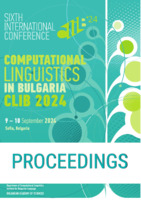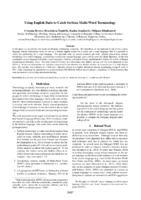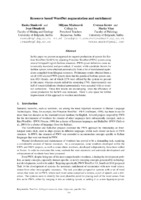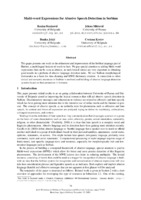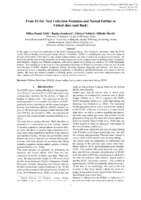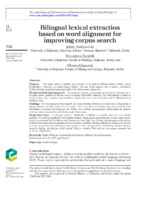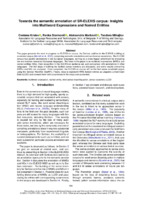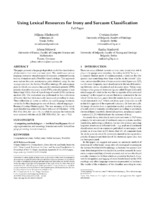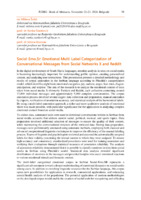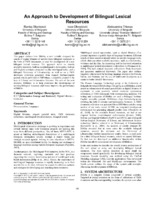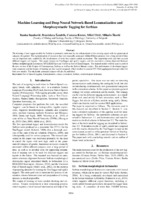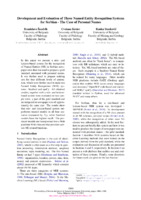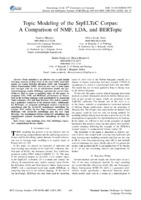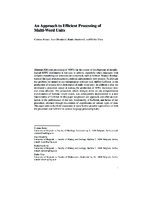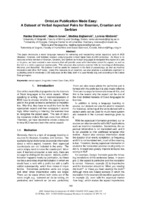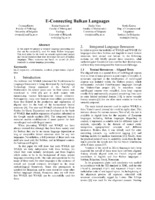Претрага
82 items
-
Advancing Sentiment Analysis in Serbian Literature: A Zero and Few-Shot Learning Approach Using the Mistral Model
Ova studija predstavlja analizu sentimenta srpskih starih romana iz perioda 1840-1920, koristeći veliki jezički model (LLM) Mistral za tehniku učenja sa zasnovani na takozvanim "zero" i "few-shot" pokušajima. Glavni pristup uvodi inovacije osmišljavanjem istraživačkih upita (promptova) uključuju tekst sa uputstvom za klasifikaciju bez primera i na osnovu nekoliko primera, omogućavajući jezičkom modelu da klasifikuje osećanja u pozitivne, negativne ili objektivne kategorije. Ova metodologija ima za cilj da pojednostavi analizu osećanja ograničavanjem odgovora, čime se povećava preciznost ...Milica Ikonić Nešić, Saša Petalinkar, Mihailo Škorić, Ranka Stanković, Biljana Rujević. "Advancing Sentiment Analysis in Serbian Literature: A Zero and Few-Shot Learning Approach Using the Mistral Model" in In Proceedings of the Sixth International Conference on Computational Linguistics in Bulgaria (CLIB 2024), BAS (2024)
-
Knowledge and Rule-Based Diacritic Restoration in Serbian
In this paper we present a procedure for the restoration of diacritics in Serbian texts written using the degraded Latin alphabet. The procedure relies on the comprehensive lexical resources for Serbian: the morphological electronic dictionaries, the Corpus of Contemporary Serbian and local grammars. Dictionaries are used to identify possible candidates for the restoration, while the dataobtainedfromSrpKorandlocalgrammarsassistsinmakingadecisionbetween several candidates in cases of ambiguity. The evaluation results reveal that,dependingonthetext,accuracyrangesfrom95.03%to99.36%,whilethe precision (average 98.93%) is always higher than the recall (average 94.94%).Cvetana Krstev, Ranka Stanković, Duško Vitas. "Knowledge and Rule-Based Diacritic Restoration in Serbian" in Proceedings of the Third International Conference Computational Linguistics in Bulgaria (CLIB 2018), May 27-29, 2018, Sofia, Bulgaria, Sofia : The Institute for Bulgarian Language Prof. Lyubomir Andreychin, Bulgarian Academy of Sciences (2018): 41-51
-
Using English Baits to Catch Serbian Multi-Word Terminology
In this paper we present the first results in bilingual terminology extraction. The hypothesis of our approach is that if for a source language domain terminology exists as well as a domain aligned corpus for a source and a target language, then it is possible to extract the terminology for a target language. Our approach relies on several resources and tools: aligned domain texts, domain terminology for a source language, a terminology extractor for a target language, and a ...aligned texts, word alignment, terminology extraction, electronic dictionaries, morphological inflectionCvetana Krstev, Branislava Šandrih, Ranka Stanković. "Using English Baits to Catch Serbian Multi-Word Terminology" in Proceedings of the 11th International Conference on Language Resources and Evaluation, LREC 2018, Miyazaki, Japan, May 7-12, 2018, European Language Resources Association (ELRA) (2018)
-
Resource-based WordNet Augmentation and Enrichment
In this paper we present an approach to support production of synsets for SerbianWordNet(SerWN)byadjustingPrincetonWordNet(PWN)synsetsusing several bilingual English-Serbian resources. PWN synset definitions were automatically translated and post-edited, if needed, while candidate literals for Serbian synsets were obtained automatically from a list of translational equivalents compiled form bilingual resources. Preliminary results obtained from a setof1248selectedPWNsynsetsshowthattheproducedSerbiansynsetscontain 4024 literals, out of which 2278 were offered by the system we present in this paper, whereas experts added the remaining 1746. Approximately one half of ...Ranka Stanković, Miljana Mladenović, Ivan Obradović, Marko Vitas, Cvetana Krstev. "Resource-based WordNet Augmentation and Enrichment" in Proceedings of the Third International Conference Computational Linguistics in Bulgaria (CLIB 2018), May 27-29, 2018, Sofia, Bulgaria, Sofia : The Institute for Bulgarian Language Prof. Lyubomir Andreychin, Bulgarian Academy of Sciences (2018)
-
FrameNet Lexical Database: Presenting a Few Frames Within the Risk Domain
U radu se daje kratak prikaz teorije semantike okvira, na kojoj je zasnovana leksička baza Frejmnet. Predstavljena je koncepcija ove mreže, kao i mogućnosti njene primene. Predstavljena je i leksička analiza koja se primenjuje u projektu izrade Frejmneta i ukazano na razlike između analize zasnovane na okviru u odnosu na analizu zasnovanu na reči. Zatim je prikazano nekoliko povezanih okvira koje prizivaju reči iz domena rizika. U radu je predstavljena i platforma NLTК pomoću koje se mogu koristiti ...Aleksandra Marković, Ranka Stanković, Natalija Tomić, Olivera Kitanović. "FrameNet Lexical Database: Presenting a Few Frames Within the Risk Domain" in Infotheca, Faculty of Philology, University of Belgrade (2021). https://doi.org/10.18485/infotheca.2021.21.1.1
-
Multi-word Expressions for Abusive Speech Detection in Serbian
Ovaj rad predstavlja istraživanja na usavršavanju i unapređenju srpske verzije rečnika Hurtlex, višejezičnog leksikona uvredljivih reči. Posebnu pažnju posvećujemo dodavanju izraza sa više reči (polileksemskih jedinica) koji se mogu smatrati uvredljivim, jer su takvi leksički zapisi veoma važni za postizanje dobrih rezultata u mnoštvu zadataka otkrivanja uvredljivog jezika. Srpski morfološki rečnici se koriste kao osnova za čišćenje podataka i stvaranje rečnika. Istaknuta je veza sa drugim leksičkim i semantičkim resursima na srpskom jeziku i predviđena je izgradnja sistema za ...Ranka Stanković, Jelena Mitrović, Danka Jokić, Cvetana Krstev. "Multi-word Expressions for Abusive Speech Detection in Serbian" in Proceedings of the Joint Workshop on Multiword Expressions and Electronic Lexicons, Association for Computational Linguistics (2020)
-
From ELTeC Text Collection Metadata and Named Entities to Linked-data (and Back)
In this paper we present the wikification of the ELTeC (European Literary Text Collection), developed within the COST Action ``Distant Reading for European Literary History'' (CA16204). ELTeC is a multilingual corpus of novels written in the time period 1840—1920, built to apply distant reading methods and tools to explore the European literary history. We present the pipeline that led to the production of the linked dataset, the novels’ metadata retrieval and named entity recognition, transformation, mapping and Wikidata population, ...Milica Ikonić Nešić, Ranka Stanković, Christof Schöch and Mihailo Škorić. "From ELTeC Text Collection Metadata and Named Entities to Linked-data (and Back)" in Proceedings of The 8th Workshop on Linked Data in Linguistics within the 13th Language Resources and Evaluation Conference, June 2022, Marseille, France, European Language Resources Association (2022)
-
Bilingual lexical extraction based on word alignment for improving corpus search
Jelena Andonovski, Branislava Šandrih, Olivera Kitanović. "Bilingual lexical extraction based on word alignment for improving corpus search" in The Electronic Library, Emerald (2019). https://doi.org/10.1108/EL-03-2019-0056
-
Towards the semantic annotation of SR-ELEXIS corpus: Insights into Multiword Expressions and Named Entities
Овај рад представља активности на развоју корпуса ELEXIS-sr, српском додатку вишејезичном анотираном корпусу ELEXIS-а, који се састоји од семантичких анотација и репозиторија значења речи. ELEXIS је паралелни вишејезични анотирани корпус на десет европских језика, који може да се користи као вишејезички репер за евалуацију европских језика са мање и средње развијеним ресурсима. Фокус овог рада је на вишечланим изразима и именованим ентитетима, њиховом препознавању у скупу реченица ELEXIS-sr и поређењу са анотацијама на другим језицима. Разматрају се први кораци ...Cvetana Krstev, Ranka Stanković, Aleksandra Marković, Teodora Mihajlov. "Towards the semantic annotation of SR-ELEXIS corpus: Insights into Multiword Expressions and Named Entities" in Proceedings of the Joint Workshop on Multiword Expressions and Universal Dependencies (MWE-UD) @ LREC-COLING 2024, Turin, May 25, 2024, ELRA and ICCL (2024)
-
Using Lexical Resources for Irony and Sarcasm Classification
The paper presents a language dependent model for classification of statements into ironic and non-ironic. The model uses various language resources: morphological dictionaries, sentiment lexicon, lexicon of markers and a WordNet based ontology. This approach uses various features: antonymous pairs obtained using the reasoning rules over the Serbian WordNet ontology (R), antonymous pairs in which one member has positive sentiment polarity (PPR), polarity of positive sentiment words (PSP), ordered sequence of sentiment tags (OSA), Part-of-Speech tags of words (POS) ...Miljana Mladenović, Cvetana Krstev, Jelena Mitrović, Ranka Stanković. "Using Lexical Resources for Irony and Sarcasm Classification" in Proceedings of the 8th Balkan Conference in Informatics (BCI '17), New York, NY, USA, : ACM (2017). https://doi.org/
-
Social-Emo.Sr: Emotional Multi-Label Categorization of Conversational Messages from Social Networks X and Reddit
U digitalnom okruženju južnoslovenskih jezika, analiza emocija u tekstovima na društvenim mrežama postaje sve važnija za razumevanje javnog mnjenja, kreiranje personalizovanog sadržaja i analizu međusobnih interakcija korisnika. U okviru ovog rada predstavljamo detaljnu metodologiju i rezultate označavanja korpusa na srpskom jeziku prema Plutčikovom modelu kategorizacije, koji prepoznaje osam osnovnih emocionalnih kategorija, kao što su radost, tuga, bes, strah, poverenje, gađenje, iščekivanje i iznenađenje. Cilj istraživanja je da se analizira emocionalni sadržaj tekstova preuzetih sa društvenih mreža X (nekada Twitter) ...Milena Šošić, Ranka Stanković, Jelena Graovac. "Social-Emo.Sr: Emotional Multi-Label Categorization of Conversational Messages from Social Networks X and Reddit" in South Slavic Languages in the Digital Environment JuDig Book of Abstracts, University of Belgrade - Faculty of Philology, Serbia, November 21-23, 2024., University of Belgrade - Faculty of Philology (2024)
-
An Approach to Development of Bilingual Lexical Resources
Stanković Ranka, Obradović Ivan, Trtovac Aleksandra. "An Approach to Development of Bilingual Lexical Resources" in Proceedings of the Fifth Balkan Conference in Informatics BCI 2012, Workshop on Computational Linguistics and Natural Language Processing of Balkan Languages – CLoBL 2012, September 2012, Novi Sad : BCI (2012)
-
Machine Learning and Deep Neural Network-Based Lemmatization and Morphosyntactic Tagging for Serbian
The training of new tagger models for Serbian is primarily motivated by the enhancement of the existing tagset with the grammatical category of a gender. The harmonization of resources that were manually annotated within different projects over a long period of time was an important task, enabled by the development of tools that support partial automation. The supporting tools take into account different taggers and tagsets. This paper focuses on TreeTagger and spaCy taggers, and the annotation schema alignment ...Ranka Stanković, Branislava Šandrih, Cvetana Krstev, Miloš Utvić, Mihailo Škorić. "Machine Learning and Deep Neural Network-Based Lemmatization and Morphosyntactic Tagging for Serbian" in Proceedings of the 12th Language Resources and Evaluation Conference, May Year: 2020, Marseille, France, European Language Resources Association (2020)
-
Development and Evaluation of Three Named Entity Recognition Systems for Serbian - The Case of Personal Names
In this paper we present a rule- and lexicon-based system for the recognition of Named Entities (NE) in Serbian news paper texts that was used to prepare a gold standard annotated with personal names. It was further used to prepare training sets for four different levels of annota tion, which were further used to train two Named Entity Recognition (NER) sys tems: Stanford and spaCy. All obtained models, together with a rule- and lexicon based system were evaluated on ...Branislava Šandrih, Cvetana Krstev, Ranka Stanković. "Development and Evaluation of Three Named Entity Recognition Systems for Serbian - The Case of Personal Names" in Proceedings - Natural Language Processing in a Deep Learning World, Incoma Ltd., Shoumen, Bulgaria (2019). https://doi.org/10.26615/978-954-452-056-4_122
-
Topic Modeling of the SrpELTeC Corpus: A Comparison of NMF, LDA, and BERTopic
Modeliranje tema je efikasan način da se dobije uvid u velike količine podataka. Neki od najčešće korišćenih metoda za modeliranje tema su Latentna Dirihleova alokacija (LDA) i faktorizacija nenegativne matrice (NMF). Međutim, sa porastom modela samopažnje i unapred obučenih jezičkih modela, pojavili su se novi načini za ekstrakcju tema. BERTopic predstavlja novi pristup modeliranju tema. U ovom radu smo uporedili performanse LDA, NMF i BERTopic na književnim tekstovima na srpskom, merenjem koherentnosti tema i raznovrsnosti tema, kao i kvalitativnom ...Teodora Mihajlov, Milica Ikonić Nešić, Ranka Stanković, Olivera Kitanović. "Topic Modeling of the SrpELTeC Corpus: A Comparison of NMF, LDA, and BERTopic" in Annals of Computer Science and Information Systems, IEEE (2024). https://doi.org/10.15439/2024F1593
-
An Approach to Efficient Processing of Multi-Word Units
Efficient processing of Multi-Word Units in the course of development of morphological MWU dictionaries is not easy to achieve, especially when languages with complex morphological structures are concerned, such as Serbian. Manual development of this type of dictionaries is a tedious and extremely slow process. To alleviate this problem we turned to our multipurpose software tool, dubbed LeXimir, in the production of lemmas for e-dictionaries of multi-word units. In addition to that, we developed a procedure aimed at making ...Cvetana Krstev, Ivan Obradović, Ranka Stanković, Duško Vitas. "An Approach to Efficient Processing of Multi-Word Units" in Computational Linguistics - Applications, Studies in Computational Intelligence 458 no. 458, Berlin Heidelberg : Springer-Verlag (2013): 109-129. https://doi.org/10.1007/978-3-642-34399-5_6
-
Managing mining project documentation using human language technology
Purpose: This paper aims to develop a system, which would enable efficient management and exploitation of documentation in electronic form, related to mining projects, with information retrieval and information extraction (IE) features, using various language resources and natural language processing. Design/methodology/approach: The system is designed to integrate textual, lexical, semantic and terminological resources, enabling advanced document search and extraction of information. These resources are integrated with a set of Web services and applications, for different user profiles and use-cases. Findings: The ...Digital libraries, Information retrieval, Data mining, Human language technologies, Project documentation... Faculty of Philology, University of Belgrade. His scientific interests include library informatics, computational linguistics, especially corpus linguistics, natural language processing and computational lexicography. In a cooperation with the other members of the HLT group, he participated in the construction ...
... for the new millennium”, in Proceedings of Corpus Linguistics Conference, University of Birmingham, Birmingham. Hardie, A. (2012), “CQPweb: combining power, flexibility and usability in a corpus analysis tool”, International Journal of Corpus Linguistics, Vol. 17 No. 3, pp. 380-409. Jurafsky, D. andMartin ...
... techniques, which are not an integral part of standard digital library development systems, must be applied. Concordances are frequently used in linguistics when studying a text. For example, comparing different usages of the same word, analysing keywords, analysing word frequencies, finding and analysing ...Aleksandra Tomašević, Ranka Stanković, Miloš Utvić, Ivan Obradović, Božo Kolonja . "Managing mining project documentation using human language technology" in The Electronic Library (2018). https://doi.org/10.1108/EL-11-2017-0239
-
OntoLex Publication Made Easy: A Dataset of Verbal Aspectual Pairs for Bosnian, Croatian and Serbian
Ovaj rad predstavlja novi jezički resurs za pretraživanje i istraživanje verbalnih aspektnih parova u BCS (bosanskom, hrvatskom i srpskom), kreiran korišćenjem principa Lingvističkih Povezanih Otvorenih Podataka (LLOD). Pošto ne postoji resurs koji bi pomogao učenicima bosanskog, hrvatskog i srpskog kao stranih jezika da prepoznaju aspekt glagola ili njegove parove, kreirali smo novi resurs koji će korisnicima pružiti informacije o aspektu, kao i link ka aspektnim parovima glagola. Ovaj resurs takođe sadrži spoljne linkove ka monolingvalnim rečnicima, Wordnetu i BabelNetu. ...Ranka Stanković, Maxim Ionov, Medina Bajtarević, Lorena Ninčević. "OntoLex Publication Made Easy: A Dataset of Verbal Aspectual Pairs for Bosnian, Croatian and Serbian" in Proceedings of the 9th Workshop on Linked Data in Linguistics @ LREC-COLING 2024, Turin, 20-25 May 2024, ELRA and ICCL (2024)
-
E-Connecting Balkan Languages
In this paper we present a versatile language processing tool that can be successfully used for many Balkan languages. This tool relies for its work on several sophisticated textual and lexical resources that were developed for most of Balkan languages. These resources are based on several de facto standards in natural language processing.Cvetana Krstev, Ranka Stanković, Duško Vitas, Svetla Koeva. "E-Connecting Balkan Languages" in Proceedings of the Workshop Workshop on Multilingual resources, technologies and evaluation for Central and Eastern European Languages, 17 September 2009, eds. C. Vertan, S. Piperidis, E. Paskaleva and Milena Slavcheva, Borovets, Bulgaria : Association for Computational Linguistics Stroudsburg, PA, USA (2009)
-
Keyword-Based Search on Bilingual Digital Libraries
This paper outlines the main features of Biblisha, a tool that offers various possibilities of enhancing queries submitted to large collections of aligned parallel text residing in bilingual digital library. Biblishsa supports keyword queries as an intuitive way of specifying information needs. The keyword queries initiated, in Serbian or English, can be expanded, both semantically, morphologically and in other language, using different supporting monolingual and bilingual resources. Terminological and lexical resources are of various types, such as wordnets, electronic ...... freely available Keyword-based search 3 data sets in various formats together with basic annotation to be used for ap- plications in computational linguistics, translation studies and cross-linguistic corpus studies [16]. Thong at al. gave various recommendations for increasing user acceptance of ...
... dictionaries of multi-word units using a multipurpose tool. In: K. Jassem, P. W. Fuglewicz, M.P., Przepirkowski, A. (eds.) Proceedings of the Computational Linguistics-Applications Conference. pp. 77–84 14. Stanković, R., Trivić, B., Kitanović, O., Blagojević, B., Nikolić, V.: The Develop- ment of the ...
... als. In: Proc. of the 12 Ranka Stanković et al. Workshop on Multilingual Linguistic Resources. pp. 97–100. Association for Com- putational Linguistics (2004) 2. Graën, J., Clematide, S., Volk, M.: Efficient Exploration of Translation Variants in Large Multiparallel Corpora Using a Relational Database ...Ranka Stanković, Cvetana Krstev, Duško Vitas, Nikola Vulović, Olivera Kitanović. "Keyword-Based Search on Bilingual Digital Libraries" in Semantic Keyword-Based Search on Structured Data Sources - Second COST Action IC1302 International KEYSTONE Conference, IKC 2016, Springer (2017). https://doi.org/10.1007/978-3-319-53640-8_10
